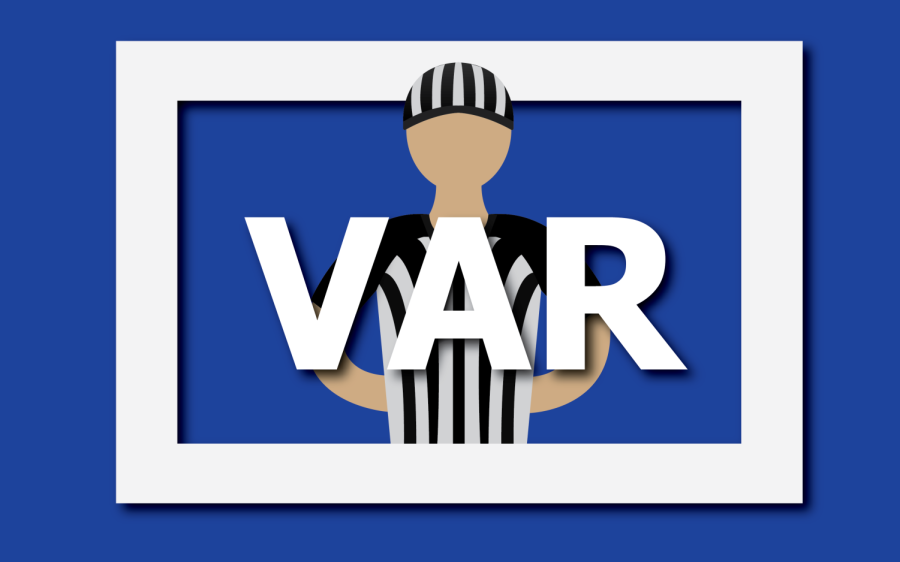Referee: Valuing Community and a Human Connection in an Increasingly Digital World
Lebron James was in sheer exultation, Feb. 7, as he broke the NBA scoring record of 38,387 points. Previously held by Kareem Abdul-Jabbar, James scored 38 points for the Los Angeles Lakers Tuesday, in a loss against the Oklahoma City Thunder. Though, before this bliss, another recent regular season matchup saw James having a meltdown on the court.
The game was tied 105-105 with four seconds left, when Lakers forward Lebron James drove to the hoop to attempt a layup. Celtics forward Jayson Tatum smacked down hard on James’ arm. He missed the shot, and time ran out. There was no foul called on the play, and in overtime, the Celtics won the game 125-121.
The official NBA referee’s Twitter account posted a tweet regretting the mistake, Jan. 29, the day after a Saturday night matchup between the Boston Celtics and the Lakers.
“Like everyone else, referees make mistakes. We made one at the end of last night’s game and that is gut-wrenching for us. This play will weigh heavily and cause sleepless nights as we strive to be the best referees we can be,” the tweet read.
Similar situations to this one happen all of the time in competitive sports. The 2018 NFC Championships between the Saints and the Rams and the 1986 World Cup Quarter match between Argentina and England have some of the most infamous missed calls ever. After the call, James was visibly distraught, frantically gesturing to the referees by slapping his arm to indicate the foul and yelling at the referees, before eventually falling to his knees and bringing his head down to the court. However, missed calls such as these are not restricted to professional sports, as missed calls frequently occur at the university level.
Ili Mossman-Smith is a second-year kinesiology major who has been refereeing for UREC since his freshman year. During that time, he has seen referees become the target of both verbal and physical abuse from students and players.
“Dealing with other students is definitely one of the hardest things, given how competitive things can get. Refs have to deal with people yelling, getting up in their face even punching them sometimes. It can be very high-stress, especially for people who have never refereed before,” Mossman-Smith said.
These situations are inevitable when it comes to being a referee, for these reasons are why training and mindset are vital for referees. Second-year Business major Jayden Bartolomew started working as a referee for UREC his freshman year, and is a referee manager this year. He has officiated and trained people in every sport that UREC offers, ranging from basketball and flag football to table tennis and dodgeball.
There is no prior knowledge required of UREC referees for the sport they are officiating, making it frustrating at times for those student-athletes who might believe they know more about the situation than a referee. The main goal at UREC is not to be perfect, rather it is seen to be a constructive experience for both players and referees.
“We have students ref basketball games having never been to a basketball game before. The main goal is to teach people how to referee competitive sports while also providing them with a fun and fulfilling job on campus,” Bartolomew said.
While this mindset of constantly improving and learning from being imperfect is perfectly fine at the recreational level, the stakes are much higher for professionals whose lives can be defined by the calls made by referees.
The example of James is just one of many incorrect calls during games that are missed throughout athletic seasons. Oftentimes, referees are not held accountable.
“The refs can do whatever they want on the court and fine players thousands of dollars for certain plays (like technical fouls) with hardly any repercussions if they get calls wrong,” Bartolomew said.
As new technology continues to be developed, automated, technological forms of refereeing are becoming more and more prevalent. Major League Baseball recently announced that they plan to implement the use of an electronic strike zone in the Minor Leagues during the 2023 season. Yet, even as technology and replays give professional sports the ability to make accurate calls, human referees remain.
Fellow UREC Referee and Manager Zak Smith, a fourth-year environmental studies and public affairs double major, feels that there are certain sports like tennis or baseball which benefit more from the acute accuracy of technology.,
“No one can understand sports like humans since humans are the one’s playing the sports,” Smith said.
Video refereeing and the use of technology to make the perfect call remain controversial in the world of sports. According to Mossman-Smith, there is a time and a place for replay and technology to step in, but the flow of the game shouldn’t suffer.
“If there was a computer that calls every single foul, then it could ruin the flow of the game,” Mossman-Smith said. “I think it’s a good idea to have video cameras for calls in the last few minutes of a game or right before the half because these are pivotal moments. When the game is on the line and the ref doesn’t make the right call, it can ruin the outcome of a player’s entire season.”
The human element of the sport can’t be forgotten according to Smith. Unless we would rather watch robots facing off against each other in flawless games of sport.
“It takes a human to understand how other humans play,” Smith said.
Sports at any level, are to be played, by and for people, and unlike what technology may be, humans are perfectly imperfect, both in the calls they make and fail to make.


